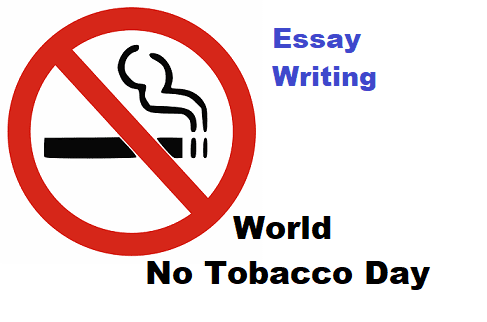World No Tobacco Day is observed on 31st May every year to raise awareness of the harms caused by tobacco products to people and environment. Lets explore more about World No Tobacco Day in this essay.

World No Tobacco Day Essay
World No Tobacco Day is an annual global initiative that highlights the health risks associated with tobacco use and advocates for effective policies to reduce tobacco consumption. Observed on May 31st each year, this day serves as a reminder of the harmful effects of tobacco and the need for concerted efforts to combat the global tobacco epidemic.
The theme for World No Tobacco Day 2023 is “We need food, not tobacco” which aims to raise awareness about alternative crop production and marketing opportunities for tobacco farmers and encourage them to grow nutritious crops. Lets explore the health risks of tobacco use, examines the strategies for tobacco control, and emphasizes the importance of collective action in achieving a tobacco-free world.
The Health Risks of Tobacco Use
Tobacco use poses a significant threat to public health, leading to a range of diseases and premature death. Smoking tobacco is the primary cause of preventable deaths worldwide, accounting for millions of deaths annually. The harmful effects of tobacco extend beyond the smokers themselves, affecting those exposed to secondhand smoke as well. Tobacco consumption is linked to various health conditions, including lung cancer, heart disease, respiratory disorders, and oral cancers. Moreover, smoking during pregnancy can have adverse effects on fetal health, contributing to complications and developmental issues.
Strategies for Tobacco Control
World No Tobacco Day serves as a platform to raise awareness about the dangers of tobacco use and promote effective strategies for tobacco control. Governments, healthcare organizations, and advocacy groups employ various measures to combat tobacco consumption and protect public health. These strategies include:
- Tobacco Taxes and Price Increases: Implementing higher taxes on tobacco products makes them less affordable, discouraging consumption, particularly among youth and low income populations.
- Smoke-Free Policies: Enforcing comprehensive smoke-free laws in public places, workplaces, and hospitality venues protects non smokers from secondhand smoke and creates a supportive environment for those attempting to quit smoking.
- Advertising and Promotion Restrictions: Banning or restricting tobacco advertising, promotion, and sponsorship curbs the industry’s ability to target vulnerable populations, especially youth, and reduces the appeal of tobacco products.
- Health Warnings and Packaging: Requiring graphic health warnings on tobacco packaging educates consumers about the risks of tobacco use and discourages smoking initiation or relapse.
- Reach to Cessation Services: Ensuring reach to affordable and effective cessation services, such as counseling, medications, and other support programs, assists individuals in quitting tobacco use.
The Role of Collective Action
Addressing the global tobacco epidemic requires collective action and collaboration among governments, healthcare professionals, civil society organizations, and individuals. Stakeholders must work together to raise awareness, advocate for strong tobacco control policies, and support cessation efforts. Governments play a crucial role in implementing evidence based policies, monitoring tobacco industry interference, and allocating resources for tobacco control programs. Healthcare professionals can provide counseling and support to individuals who want to quit smoking, while also advocating for tobacco-free environments. Civil society organizations and advocacy groups play a vital role in raising public awareness, engaging in policy advocacy, and promoting community based initiatives.
Conclusion
World No Tobacco Day serves as a powerful reminder of the urgent need to address the global tobacco epidemic. By raising awareness about the health risks of tobacco use and advocating for effective tobacco control measures, this annual event plays a crucial role in protecting public health and saving lives. It is through the collective efforts of governments, healthcare professionals, civil society organizations, and individuals that we can create a tobacco-free world. On this day and beyond, let us renew our commitment to combatting the global tobacco epidemic and promoting a healthier future for all.
